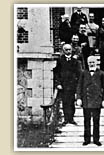
As the objective was to win over Bulgaria, the cessation of Greek territories
in eastern Macedonia was proposed. This proposal was put forward both by the Allies, who had
proposed to Greece territorial exchanges in Asia Minor in return, and later by the Central Powers,
with which Bulgaria finally aligned and captured eastern Macedonia.
The question of ceding Greek territories to Bulgaria exacerbated
the relations between the Venizelists and the Constantinists. From both sides
accusations of treason were launched, according to adherence to one or other international league (Entente or Central Empires) and to plans for the capture of the area by the Bulgarians.
In 1915 Venizelos openly supported the coalition with the Entente. The allied operations
in the peninsula of Gallipoli against Turkey served as a pretext. The Prime Minister proposed
the participation of Greek troops in these operations. He thus encountered strong opposition
from the King. This conflict led to the resignation of the Prime Minister.
Venizelos, regaining power after the elections of summer 1915, and in the face of Bulgaria entering the war and its attack on Serbia, gave orders for mobilization. The
desicion was nominally ratified by Constantine. At the same time Entente forces landed and
took control of Thessaloniki. When the Prime Minister Venizelos brought forward the matter
of active participation, he was once more led to resignation. There was again his fundamental
disagreement with Constantine, who did not wish to confront Germany at any cost. The Venizelists, however, held
the majority in Parliament and their foreign policy was endorsed by the people's vote.
The capture of eastern Macedonia and the city of Kavala by
the Bulgarian army, the emprisonmnet of parts of the Greek army and the persecutions
of the Greek population in the summer of 1916 rendered more acute
the clash between the two camp vis-a-vis the international
conflict. Eleftherios Venizelos decided to side with the movement of the National Defence
and formed a revolutionary government in Thessaloniki, declaring war on the Central Powers and, naturally,
Bulgaria.
|
 |
